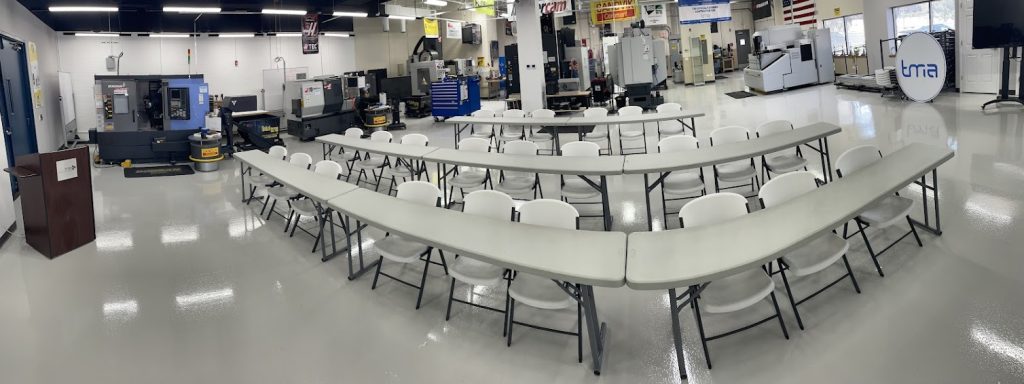Standing in the doorway of the Technology & Manufacturing Association’s (TMA) Training Center in 2025, one can’t help but be in awe of how 21st-century manufacturing is evolving, and contemplate how much different a manufacturing training center must have looked in 1945.
How It All Began
1945 – the year that TMA, the former Tool & Die Institute (T&DI), announced its ground-breaking endeavor to establish an apprentice training program. According to the earliest mentions found in TMA archives, World War II soldiers returning to U.S. shores motivated the launch of the apprentice training program.
In a mailing sent from T&DI dated November 28, 1945, they wrote,
The returning veteran and his relationship to apprentice training is the highly important and timely subject to be discussed at a general meeting of the Institute’s membership…. The topic will be covered completely by a panel of four experts, including Col. H. H. Wymer, Veteran’s Employment Service, J. Vernon Johnson, U.S. Apprentice Training Service and several others. President Charles Bohmer will lead the discussion.
The notice says apprentice training “is vital to the well-being of the industry”- a comment heard daily among manufacturers in 2025.
The 1945 T&DI mailer goes on:
If the tool and die industry is to maintain its hard-won place so capably earned in the industry, there must be continuous replacements of young men coming in from the ranks. Among the millions of returning vets there are undoubtedly a number of just the caliber needed in the tool and die industry. Helping you and the Institute to screen out the proper men best fitted to become tool & die makers is the purpose of the meeting.
Does this sound familiar? Okay, there may be some slight changes today, such as including women in the scenario, for instance. But those comments reflect the same concerns about the industry’s future today as they did two generations ago.
Changes Over the Years
While the emphasis on training in 1945 was mainly on tool & die makers, over the years, TMA’s awareness of industry needs expanded those apprenticeships to include two other educational paths stemming from the basic “Related Theory” roots: CNC machining and mold-making.
During the 1960s and 1970s, the manufacturing industry exploded in America, and TMA trained hundreds of skilled machinists each year. The interest in the industry was overwhelming, and the culture encouraged machining among middle and high schoolers. Workshop classes were commonly available in high schools during those years. Apprentices learned their in-demand skills with manual precision measuring tools, lathes, dies, and molds on American assembly lines. Computers were not yet commonly used by manufacturers.
Then, the computer age arrived in the 1980s and 90s, and as a result, more career counselors focused on college-level and liberal arts courses. University-level education was glamorized among the U.S. youth as more and more turned to medical and legal profession choices.
At one time, despite all the success for years and years beforehand, TMA paused apprenticeship training in the early 2000s. The training program was revived when Patrick Osborne joined TMA and began gathering staff to restructure training and assist TMA members in finding skilled, qualified team members.
That team grew TMA’s training efforts, focused on promoting the industry among younger and younger career seekers with the idea of “workforce development.” Osborne became president of TMA in 2022, aiming to grow the Association and expand its training program to meet the growing needs of 21st-century manufacturers.
TMA’s Training Future
 In 2024, TMA tapped Cassie Khurana to lead TMA’s next chapter in apprenticeship training.
In 2024, TMA tapped Cassie Khurana to lead TMA’s next chapter in apprenticeship training.
Mrs. Khurana, who started at TMA managing member accounts, was tasked with directing the training program armed with a master’s degree from Judson University in nonprofit administration, program evaluation, and program development. She also holds a master’s in clinical mental health counseling.
During her many visits to TMA members, Khurana heard from members about the urgency of hiring trained and qualified machinists. Thus, she prepared for the challenge she’s now meeting.
“I’m from a small town near Springfield, Illinois, where my dad owned a small business. I understand a lot of the issues that our TMA members face and understand that aspect of the industry. Education is a major important aspect of life for me, so I enjoy growing our training education department opportunities that allow individuals to learn something new, make a better life, and create a career in more non-traditional ways,” she told TMA News.
She understands both sides of the college versus skilled training debate.
“From all the members that I’ve talked with, they have such a huge need for more individuals to come in who have a bit of this type of training. And I’ve heard even from young people that they’re looking for career alternatives other than racking up a lot of debt. So what we offer at TMA Training is a really good option,” she said. “It is really a matter of asking themselves, ‘What are you good at? What do you enjoy? What are you going to be successful at?’ It’s not an effort to push them all into college or university.”
In addition, Khurana says it’s important to attract the next generation of manufacturers by appealing to something that may be a bit surprising to veteran industry leaders. It’s about the effect their work could make on their world and letting them add value with their ideas.
“Having them understand what they’re doing and why they are doing it is an important aspect of the younger generation. They really value whenever they understand how they’re making an impact,” Khurana said.
“And I think that entire generation loves to be heard. Part of being heard is having an understanding that they’re doing right so they can talk about it and feel valuable in their situations. It is important for the younger generations for us to give them more information about what they’re doing and why they are doing it. That will help them be fueled to work hard.”

Training for the Future
Besides the Related Theory courses in tool and die making, mold making, and CNC machining, TMA offers various topics, including Swiss machining and advanced G-Code courses. At the end of 2024, TMA’s Training Center was generously gifted with three new mechanical operational systems that will soon launch new training courses: a 3-D printer, two cobots, and two EDM machines.
Rather than focusing on gaining government funding for their efforts, TMA’s Training & Education focuses on providing the technical training its members need and demand.
“TMA’s big mission is delivering what our members want because we are member-funded and supported,” Khurana said. “The most wonderful part about my job is we get to actually learn from the members what they want and then do all we can to deliver what they want, which is so cool. We don’t have any outside influences to worry about.”
In addition to developing new hands-on courses for the donated machines, TMA continues to offer online courses and is working to expand their availability and solidify the curricula for adult learning and career-enhancing certification.
All that is in process, in addition to the popular Manufacturing Leaders Program for rising executives offered in conjunction with Judson University in Elgin, Illinois.
“Manufacturing is one of the most important wealth producers there could be, but for some reason, America has veered away from encouraging people to consider those careers. We need to continue them,” she said.
Challenges and Rewards
So, what is the biggest challenge for the new TMA Training & Education chapter?
“The biggest challenge is letting our members know what we have available and what we can do for them in training. We can deliver whatever they need. We will make, we will move mountains, we will do whatever we can to serve our members. And that’s one of the reasons I absolutely love TMA,” Khurana said.
And that leads to the biggest reward of directing Training & Education for Khurana.
“I love that this job impacts not just me but so many people and our country. We are creating careers here at TMA, not just jobs. It’s creating careers because the manufacturing industry creates careers. That is very rewarding for individuals and very fulfilling for me,” she said.
How coincidental that those words could have been a part of that first Tool & Die Institute discussion about apprentice training back in 1945?
And how true will those words be in 2045?
First published in TMA News Bulletin January – March 2025


